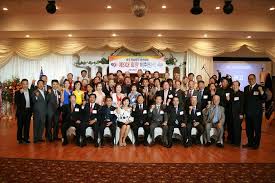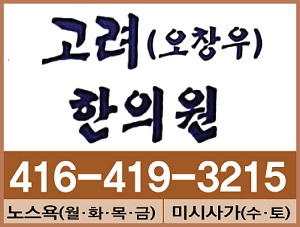CA
ON
변호사 정찬수 법률사무소
전화: +82 2-536-1144
서울특별시 서초구 서초동 Toronto, ON
1.jfif)
골프 싱글로 가는길
전화: 647-291-2020
115 York Blvd Richmond Hill Toronto, ON

행복부동산 -수잔정 Home Standards Brickstone Real
전화: 647-866-7878
180 Steeles Ave W Unit 30, Thornhill, ON

싸인건설
전화: 416-909-7070
4065 Chesswood Dr. North York, ON
0.jfif)
호남향우회 (토론토)
전화: 647-981-0404
7 Bishop Ave. #2411 Toronto, ON

고려 오창우 한의원
전화: 416-226-2624
77 Finch Ave W #302, North York Toronto, ON

럭키 여행사
전화: 416-938-8323
4699 keele st.suite 218 toronto Ontario M3J 2N8 toronto, ON

홍이표치과
전화: 647-985-0456
9625 Yonge St #4, Richmond Hill, ON Toronto, ON
1.jfif)
1004열쇠
전화: 416-895-1004
4 Blakeley Rd. Toronto, ON

토론토 민박 전문집
전화: 416-802-5560
Steeles & Bathurst ( Yonge) Toronto, ON

토론토 기쁨이 충만한 교회
전화: 416-663-9191
1100 Petrolia Rd Toronto, ON

캐나다 공인 컨설턴트 - 한인크레딧 컨설팅
전화: 416-897-8438
1 High Meadow Place, Unit 2 North York, ON

It would be a place where all the visitors including me share the life stories and experiences through their activities,especially on life as a immigrant.
Why don't you visit my personal blog:
www.lifemeansgo.blogspot.com
Many thanks.
블로그 ( 오늘 방문자 수: 137 전체: 227,010 )
Obama Takes Stern Tone on North Korea and Iran
lakepurity
2009-11-19
정상회담후 기자회견에서 질의 응답하고 있는 양국의 정상.
한국을 방문중인 미국의 오바마 대통령이, 북한에 대해서 강한 톤으로, 6자회담에 참석
해서, 핵문제를 해결하는데 노력해야 할것이라고 몰아 부쳤다고 한다.
특히 6자회담 참석을 한다 해도, 전과 같이 행동해서는 안된다고 단서까지 부쳤다.
즉 전에는 회담에 참석해서, 요구조건을 내걸다 관철이 안되면 퇴장하고, 얼마 있다가
다시 회담에 복귀해서 회담당사국들로 부터 필요한것 얻어냈다가, 또 다시 다른 조건을
내걸고, 관철이 안되면 다시 퇴장하곤 했던 그런 회담자체를 이제는 용인 하지 않을
것이라고 설명하면서, 6자회담의 조속한 참가를 종용하기위해 다음달에 보스워드 특사를
북한에 파견하게 된다고 기자회견에서 말했다.
앞서 방문했던 일본과 중국에서의 여려웠던 정상회담과는 달리, 고국 한국방문은
모든게 순조로워 보인다고 뉴욕 타임스는 평했다. 단 한가지 양 정상이 의견을 달리 한것은
한미 FTA의 조속한 국회비준을 미국이 이행해 줄것을 촉구하는 것외에는 화기애애했다고
한다. 오바마의 설명에 의하면, FTA비준이 의회에서 늦어지는 이유는, 미국산 자동차의
한국에 대한 수출쿼터때문이라고 한다.
전임 김대중과 노무현 정부때는, 부쉬의 한반도 정책 때문에 핵문제 해결을 포함한 북한과의
관계를 어렵게 했다고, 미국정부를 비난 했던것과는 달리, 이번 이명박 정부는
북한의 핵무장 해제를 위해 미국과 한국이 한목소리를 내는것은
한반도의 앞날과 경제발전을 위해서 좋은 징조인것 같아 보인다. 국제 외교에서 서로 협조하면서
바로 실리를 챙기는 정책이 미국의 정책과 맞아 떨어지는것 같다.
조국이 경제적, 정치적으로 더 발전하고, 북한이, 결국 한국을 겨냥하기위해 핵개발을
고집하는 그런 무모한 행동을 접고, 국제사회 무대로 복귀해서, 굶주리고 헐벗은 북한
주민들에게 배고픔을 조속히 없애는데 주력했으면 하는 마음 간절하다.
오바마 대통령의 한국 방문에 대한 New York Times 기사를 옮겨 싣는다.
Obama Takes Stern Tone on North Korea and Iran
Stephen Crowley/The New York Times
President Obama and President Lee Myung-bak of South Korea fielded questions during a press conference at the Blue House in Seoul on Thursday.
By HELENE COOPER and MARTIN FACKLER
Published: November 18, 2009
SEOUL, South Korea — President Obama delivered a stern message on Thursday to North Korea and Iran that they risk further sanctions and isolation if they do not rein in their nuclear ambitions.
Appearing at a joint press conference with President Lee Myung-bak of South Korea, Mr. Obama singled out Iran, where leaders have apparently rejected an offer from the West to take Iran’s stockpile of enriched uranium to another country to turn it into fuel rods, which would buy time for diplomatic negotiations.
“We’ve seen indications that for internal political reasons or perhaps because they are stuck in some of their own rhetoric, they are unable to get to ‘yes,’ ” Mr. Obama said. “As a consequence, we have begun discussion with our international partners” on sanctions, he said.
He said that over the next few weeks the United States would be developing a package of “potential steps we can take that will indicate our seriousness.”
Mr. Obama’s words were his strongest to date and seemed to signal that he was ready to move to sanctions.
On the North, Mr. Obama said he was sending his North Korea envoy to Pyongyang next month for talks designed to try to get the nation back to the bargaining table. But he warned that even getting the North back to the table would not be enough.
“I want to emphasize that President Lee and I both agree on the need to break the pattern that existed in the past in which North Korea behaves in a provocative fashion, then is willing to return to talks, and then talks for a while, and then leaves the talks and seeks further concessions,” Mr. Obama said.
Mr. Obama’s visit to Seoul is the last — and perhaps easiest — leg of an Asia trip in which he was forced to deal with a newly assertive Japan and an increasingly powerful China.
South Korea quickly proved true the predictions that it would be more accommodating to Mr. Obama, with whom Mr. Lee has been cooperating closely on key issues, including efforts to eventually halt North Korea’s nuclear program.
On Thursday morning, the Koreans put on a rousing welcoming ceremony for Mr. Obama. On the terraced lawn in front of the Blue House, the presidential offices in Seoul, a colorful array of ceremonial guardsmen, band members and local children greeted Mr. Obama, playing “The Star-Spangled Banner” and waving American flags.
South Korean government officials and diplomatic analysts said that the visit represented a chance for Seoul to raise its profile with the Obama administration by stressing its reliability as a partner in Asia.
Mr. Lee is more closely aligned with American policy than were his liberal predecessors, who saw President George W. Bush’s tough stance on North Korea as counterproductive, and he was elected on a platform of getting tough with Pyongyang. But Mr. Lee has been criticized by the left for his decision to send more aid workers and a small military contingent to Afghanistan in support of the American-led effort there.
During large antigovernment protests last year over beef imports from the United States — an issue that tapped into an undercurrent of anti-American feelings — Mr. Lee was accused of kowtowing to American leaders. In anticipation of demonstrators this visit, the government says it will deploy about 13,000 police and soldiers.
The only potential point of contention on the visit was that Washington still was not moving to ratify a free-trade agreement agreed upon two years ago. Mr. Obama said that he wanted to get it done but acknowledged that “there is obviously a concern in the United States of the incredible trade imbalances that have grown in the past few years.”